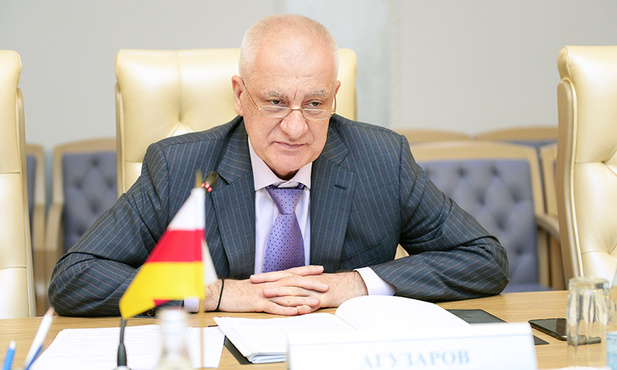
Moscow’s Desire to Micro-Manage the North Caucasus Causing Multiple Inefficiencies
Publication: Eurasia Daily Monitor Volume: 13 Issue: 40
By:

On February 19, the governor of North Ossetia–Alania, Tamerlan Aguzarov, suddenly died at a Moscow hospital from complications of pneumonia. The 52-year-old governor was in office for a little more than eight months and, according to some reports, was fighting cancer. Aguzarov was also known for having been the judge who presided over the notorious trial of Nurpashi Kulaev, who was among the Beslan school hostage takers in 2004 (Lenta.ru, February 19).
The regional governor’s sudden death apparently took Moscow by surprise because its reaction was marked by confusion. When the Kremlin decides on the candidacy of the future governor, the candidate is appointed with the status of “temporarily acting” governor. Later, the “temporarily acting” governor is formally confirmed as the head of the republic by the regional parliament. In North Ossetia, the head of the republican government, the prime minister, becomes the acting republican governor when the incumbent governor cannot carry out his duties. However, Moscow apparently had some reservations about the prime minister of North Ossetia—Vyacheslav Bitarov, a successful local businessman. The Russian president abstained from confirming Bitarov as the “temporarily acting” governor of the republic, which would have practically guaranteed his “election” by the regional parliament (Abon-news.ru, February 28). Hence, rumors abounded about who would become the republic’s next governor. Some analysts pointed to North Ossetian officials, while others said the Kremlin was likely to appoint a Moscow-based Ossetian (Kommersant, February 24).
In the past several years, Moscow appointed people from outside the republics as their governors. The two most recent appointments were of the governors in Dagestan and Kabardino-Balkaria, in 2013. A Moscow-based politician, Ramazan Abdulatipov, was dispatched to lead Dagestan, while a security services officer, Yuri Kokov, was appointed governor of Kabardino-Balkaria. The same logic is likely to apply in the North Ossetian case. Yet, simple as it may seem, appointing people from Moscow to lead the North Caucasian republics is becoming increasingly hard, because of a deficit of suitable candidates.
Ongoing ethnic and religious tensions, economic woes, armed conflict and separatist sentiments require appointing highly qualified candidates to lead the North Caucasian republics. The Russian government has indicated its preference for candidates who are disconnected from the regional elites and integrated into the Russian elites in Moscow. While finding figures disconnected from the regional elites is easy, it is much harder to find those who are integrated into the Russian elites at the federal level and are qualified to be governors. For example, Moscow appointed a well-known Russian constitutional scholar of Karachay origin, Boris Ebzeyev, to lead Karachaevo-Cherkessia in 2008. However, by 2011, Ebzeyev was completely sidelined and so isolated in the republic that he had to step down before the end of his first term and urgently leave the republic (Expert.ru, February 28, 2011).
For a long time, the unspoken consensus in Russia was that Moscow controlled the entire central government while regional elites in the North Caucasus controlled their respective republics. As a result of such a consensus, few if any North Caucasians received important government positions in the government of the Russian Federation. During the Soviet period, every large nationality had to be represented at the union level to ensure that the principle of representation was observed. Even if this representation was empty, the public appearance of representation was important. In contemporary Russia, North Caucasians do not receive similar representation at the federal level, and it is unclear whether the Russian majority would tolerate such representation, given the rise of Russian nationalism over the past few decades. Until recently, the local North Caucasian elites were largely confined to their own republics and it worked to some extent. However, now it appears that Moscow wants to increase its level of control over political life at the republican level as well, without giving the local elites the corresponding “compensation” at the federal level. This change naturally creates multiple problems for both the republics and Moscow.
First of all, the republican elites resist Moscow’s attempts to take away their regional domains without giving them something in return. Secondly, since Moscow has excluded the North Caucasians from federal level government jobs, it is short of candidates to fill government posts at the regional level.
Moscow’s model of regional governance is affected by other, more technical issues. One is that Moscow is increasingly short of cash to support current living standards in the heavily subsidized regions in the North Caucasus. The other is that due to Russia’s collision course with the Western powers and several gambles abroad, President Vladimir Putin has little time for the North Caucasus, which he apparently “micro-manages”; and this is sensed in the region. Apart from the disarray in Moscow’s signaling about the next governor of North Ossetia, it also affects other republics. The first term of the governor of Karachaevo-Cherkessia, Rashid Temrezov, is to expire on March 1, and Putin signed a decree confirming Temrezov as the republic’s “temporarily acting” governor on February 27 (Kremlin.ru, February 27). Ramzan Kadyrov’s term is running out on March 5 and, as of February 28, it was still unclear whether he will remain in power or step down. Kadyrov’s frantic interviews for the Russian media and pledges to Russia and Putin indicate that he cannot get through to Putin and is unsure about his political future (Meduza.io, February 27).
In 2004, Putin may have thought that abolishing direct gubernatorial elections was a good idea that would allow him to establish tighter control over Russia’s regions. However, several systemic trends indicate that the system of appointing governors is in crisis. That system probably solved the issue of control for Putin in the short run, but it also created problems that are increasingly hard to solve, especially since the Russian president is engaged in several ongoing foreign policy gambles.




